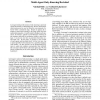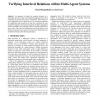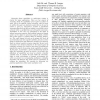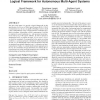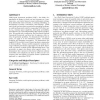619 search results - page 3 / 124 » A logical formalism for the subjective approach in a multi-a... |
CORR
2000
Springer
13 years 8 months ago
2000
Springer
Levesque introduced the notion of only-knowing to precisely capture the beliefs of a knowledge base. He also showed how only-knowing can be used to formalize non-monotonic behavio...
ECAI
2006
Springer
14 years 6 days ago
2006
Springer
An approach to handle the complex dynamics of a multi-agent system is based on distinguishing aggregation levels by structuring the system into parts or components. The behavior of...
ICAI
2003
13 years 10 months ago
2003
Reasoning about capabilities in multi-agent systems is crucial for many applications. There are two aspects of reasoning about the capabilities of an agent to achieve its goals. O...
ATAL
2008
Springer
13 years 9 months ago
2008
Springer
The aim of this paper is to provide a logical framework for the specification of autonomous Multi-Agent Systems (MAS). A MAS is autonomous in so far as it is capable of binding (...
ATAL
2007
Springer
14 years 15 days ago
2007
Springer
Multi-Agent Agreement problems (MAP) - the ability of a population of agents to search out and converge on a common state - are central issues in many multi-agent settings, from d...
